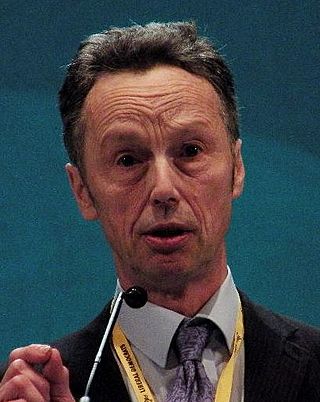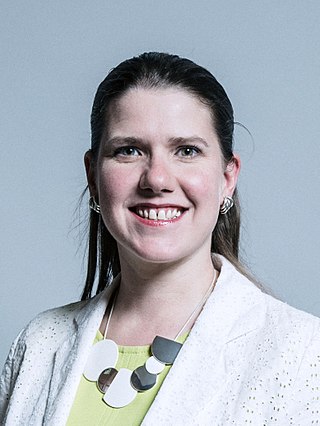
Sir Edward Jonathan Davey is a British politician who has served as Leader of the Liberal Democrats since 2020, having acted in the position from 2019 to 2020. He served in the Cameron–Clegg coalition as Secretary of State for Energy and Climate Change from 2012 to 2015 and as Deputy Leader to Jo Swinson in 2019. An "Orange Book" liberal, he has been the Member of Parliament (MP) for Kingston and Surbiton since 2017, and served in the same role from 1997 to 2015.

Sir Norman Peter Lamb is a British politician and solicitor. He was the Liberal Democrat Member of Parliament (MP) for North Norfolk from 2001 to 2019, and was the chair of the Science and Technology Select Committee from 2017 to 2019.

John David Pugh is a British Liberal Democrat politician. He was the Member of Parliament for Southport from 2001 to 2017. He stood down at the 2017 snap election. In November 2017, he was elected to Sefton Metropolitan Borough Council as a councillor for Duke's Ward.

Joanne Kate Swinson is a British former politician who was Leader of the Liberal Democrats from July to December 2019. She was the first woman and the youngest person to hold the position, as well as the shortest-serving holder of the post. Swinson was Member of Parliament (MP) for East Dunbartonshire from 2005 to 2015 and 2017 to 2019. In September 2020 Swinson became Director of Partners for a New Economy (P4NE).

Timothy James Farron is a British politician who served as Leader of the Liberal Democrats from 2015 to 2017. He was elected Member of Parliament (MP) for Westmorland and Lonsdale in 2005 and is the Liberal Democrat Spokesperson for Environment, Food and Rural Affairs. Before entering politics, he worked in higher education.
The Beveridge Group is a centre-left group within the Liberal Democrat party in the UK. It was set up in 2001 by MPs Alistair Carmichael, Paul Holmes, John Barrett and John Pugh to promote debate within the party regarding public service provision.
In the 2006 Liberal Democrats leadership election, Sir Menzies Campbell was elected to succeed Charles Kennedy as Leader of the Liberal Democrats, the third-largest political party in the United Kingdom.
This timeline of events in the Liberal Democrats leadership election, 2006 lists the events covering the period from Charles Kennedy's initial call for a leadership election with the Liberal Democrats to the conclusion of the 2006 Liberal Democrats leadership election.

The Liberal Democrats are a political party in the United Kingdom. Party members elect the leader of the Liberal Democrats, the head and highest-ranking member of the party. Liberal Democrat members of Parliament also elect a deputy leader of the Parliamentary Party in the House of Commons, often colloquially referred to as the deputy leader. Under the federal constitution of the Liberal Democrats the leader is required to be a member of the House of Commons.
The 2007 Liberal Democrats leadership election was held following the resignation of Sir Menzies Campbell as leader on 15 October 2007, after 19 months as leader of the Liberal Democrats, the third-largest political party in the United Kingdom. Vincent Cable, the deputy leader of the parliamentary party, was acting leader until the conclusion of the leadership election. The result was announced on 18 December 2007 with Nick Clegg winning by a narrow margin of 1.2%.

The Liberal Democrats are a liberal political party in the United Kingdom, founded in 1988. Since the 1992 general election, with the exception of the 2015 general election, they have been the third-largest UK political party by the number of votes cast. They have 15 members of Parliament in the House of Commons, 84 members of the House of Lords, four Members of the Scottish Parliament and one member in the Welsh Senedd. The party has nearly 3,000 local council seats. The party holds a twice-per-year Liberal Democrat Conference, at which party policy is formulated. In contrast to its main opponents' conference rules, the Lib Dems grant all members attending its Conference the right to speak in debates and vote on party policy, under a one member, one vote system. The party also allows its members to vote online for its policies and in the election of a new leader. The party served as the junior party in a coalition government with the Conservative Party between 2010 and 2015; with Scottish Labour in the Scottish Executive from 1999 to 2007, and with Welsh Labour in the Welsh Government from 2000 to 2003 and from 2016 to 2021.

Layla Michelle Moran is a British Liberal Democrat politician serving as the Liberal Democrat Spokesperson for Foreign Affairs and International Development since 2020, and serving as the Member of Parliament for Oxford West and Abingdon since 2017.
The 2010 Liberal Democrats deputy leadership election began on 26 May 2010, when the sitting Deputy Leader of the Liberal Democrats, Vince Cable, announced his resignation following his appointment as Secretary of State for Business, Innovation and Skills in the Conservative-Liberal Democrat coalition government. Nominations closed on 2 June, and the balloting took place on 9 June. The election was won by Simon Hughes.
The list that follows is the Liberal Democrats Frontbench Team/Shadow Cabinet led by Menzies Campbell from 2006 to 2007.
The 2015 Liberal Democrats leadership election was held on 16 July 2015 following the resignation of Nick Clegg as leader on 8 May 2015, after almost eight years as leader of the Liberal Democrats, following the party's poor performance at the 2015 general election.
The 2017 Liberal Democrats deputy leadership election was announced on 14 June 2017, and Jo Swinson was elected unopposed on 20 June.

Wera Benedicta Hobhouse is a British-German politician. A member of the Liberal Democrats, she has been the Member of Parliament (MP) for Bath since 2017 and serves as the Liberal Democrat Shadow Leader of the House of Commons and the Spokesperson for Energy and Climate Change and Transport under Ed Davey.

On 20 July 2017, Sir Vince Cable became Leader of the Liberal Democrats after facing no competition. He was the oldest leader of a major UK political party since Sir Winston Churchill. Upon taking office Cable made no significant reshuffle to his Frontbench Team, so the line-up remained much as it was inherited from Tim Farron. Cable later completed his first reshuffle a few weeks after the Party's 2017 Autumn Conference.
The 2019 Liberal Democrats leadership election was held following the announcement of the resignation of Vince Cable as leader on 24 May 2019, after just under two years as leader of the Liberal Democrats in the United Kingdom. The two candidates to succeed Cable were Ed Davey and Jo Swinson.
The 2020 Liberal Democrats leadership election was held in August 2020, after Jo Swinson, the previous leader of the Liberal Democrats, lost her seat in the 2019 general election. It was initially set to be held in July 2020, but due to the COVID-19 pandemic it was delayed by six weeks, having been at first postponed until May 2021.










